Is Boosting Self-esteem a Good Thing?

Is boosting self-esteem a good thing or has it led to a generation of self-entitled snowflakes who do not have the skills to cope with the challenges life throws at them. Although there tends to be a preoccupation by parents, teachers and society in general to boost esteem, is it a dangerous preoccupation that only boosts ego? Are purveyors’ motives of boosting self-esteem grounded in scientific fact or intuitive feelings of doing good? Research has shown for decades that such efforts do little, if not anything, to improve academic performance, develop better interpersonal skills or prevent troublesome behavior. In fact, evidence supports the opposite, that artificially boosting self-esteem may lower overall performance, leave people more prone to disregard risks such as drug abuse as well as engage in sex (Baumeister, Campbell, Krueger, & Vohs, 2005).

The corollary, that the root of individual and therefore societal problems lies within the annals of low self-esteem is not only wrong, it is counter productive at best and dangerous at least. Raising self-esteem has been argued to reduce crime, drug abuse, academic underachievement, teen pregnancy, pollution and even as increased self-esteemed people supposedly earn higher wages, pay more taxes and therefore help balance state budgets as put forth in the late 1980s in California (Mecca, Smelser, & Vasconcellos, 1989). Little, if no evidence, was cited supporting assertions in the report.

Research has shown that people who consider themselves to be physically attractive have inherently high self-esteem. People who do not consider themselves to be gorgeous in their own eyes have low self-esteem, tended to be negative about everything and traditionally have been erroneously assessed prejudiced. However, it is difficult to justify a person to be prejudiced for rating people not like themselves negatively when they also rate themselves negatively. In fact, using the same criteria, the reverse is found. People with high self-esteem appear to be more prejudiced. The negatively natured low self-esteemed individuals usually describe their lives in a similar manner, negatively, and furnish an appearance that low self-esteem has unpleasant outcomes. Indeed, if high self-esteem manifest positive outcomes, then it would well be worth the time, effort and expense of instilling into individuals. However, if a positive self-image results from good behavior or success, then there is little to be gained in expending this time, effort and expense instilling self-esteem alone into individuals.
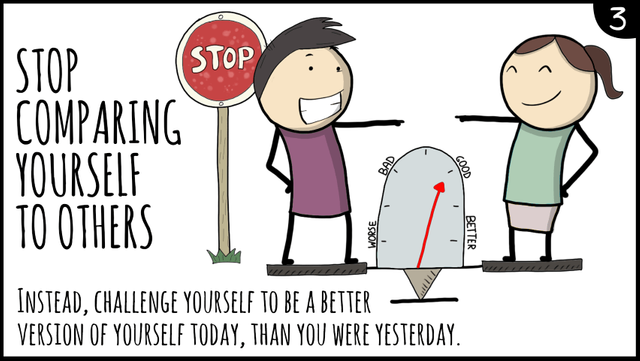
Upon reviewing studies relating self-esteem to academic performance, it was reasoned that boosting self-esteem a potent tool for helping students as logic suggests high self-esteem enhances students’ persistence and striving while reducing the paralyzing feelings of self-doubt and competence. However, studies do not show that higher self-esteem induce students to do better.
Pottebaum, Keith, and Ehly (1986) studied over 50,000 students along with several other studies (Baumeister et al., 2005; Keith, Pottebaum, & Eberhart, 1986; Pullmann & Allik, 2008) which indicate that rising self-esteem did not offer students much benefit. In fact, some studies suggested that artificially raising self-esteem may lower subsequent performance.
Researchers found the correlation between sophomore self-esteem and senior academic performance the same as the correlation between sophomore academic performance and senior self-esteem making it difficult to identify if either trait helps the other or if there is a third factor that gives rise to both superior achievement and high self-esteem.
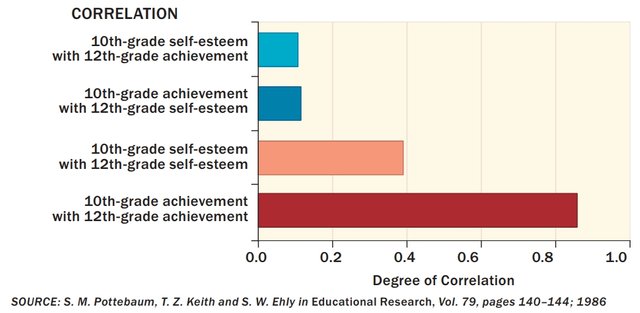
Further, in considering that artificially raising self-esteem could serve a purpose later in life on the job it was concluded that the same effects echoed that of schoolwork studies. Even this failure to contribute significantly at school and the office would easily be offset if this heightened sense of self-worth helped people get along better with others. A good self-image might be preferable over individuals that suffer from self-doubts and insecurities.

People with high self-esteem regard themselves as popular and rate their friendships as superior to those of low self-esteem who report less social support and more negative interactions. However, these assertions do not reflect reality as Bishop and Inderbitzen (1995) found when asking 542 ninth-graders to nominate their most-liked and least-liked peers of which the resulting rankings displayed zero correlations with self-esteem scores.

The same has been found true in adults. Buhrmester, Furman, Wittenberg, and Reis (1988) found strong links between self-esteem and various interpersonal skills but only when subjects rated themselves. When their roommates rated these same subjects, correlations with self-esteem fell for four of the five skills surveyed to levels that were not significant. However, as one might expect, the correlation between self-esteem and prowess in initiating relationships stayed somewhat robust.

The study found that college students with high self-esteem claimed to be substantially better at initiating relationships, disclosing personal aspects about themselves, asserting themselves in response to others’ objectionable behaviors, providing emotional support and even managing interpersonal conflicts. As mentioned earlier, the correlation with self-esteem for four of the five interpersonal skills surveyed dropped to near zero except for the subject’s ability to initiate new social contacts and friendships.
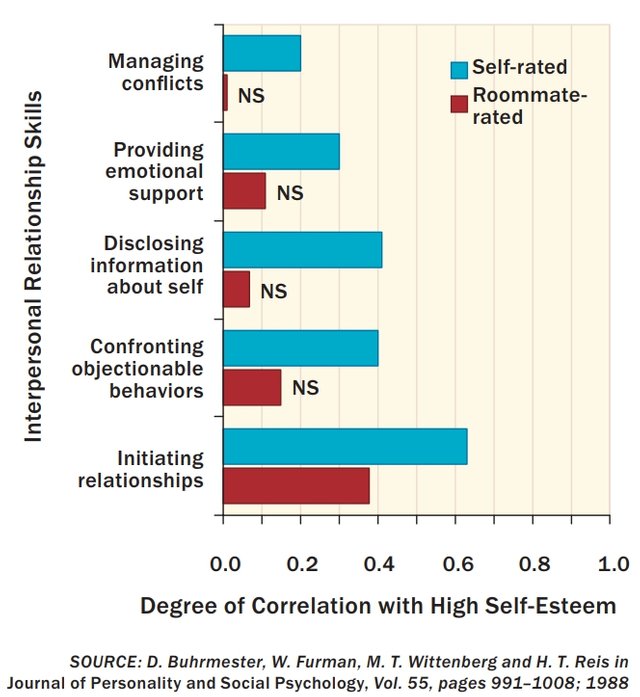
As expected, people who think they are desirable and attractive should be adept at starting conversations with strangers, contrasting those with low self-esteem who tend to shy away fearing rejection.

Murray, Rose, Bellavia, Holmes, and Kusche (2002) found that people with low self-esteem tend to distrust their partner’s expression of love and support and constantly expected rejection. Currently there has not been any evidence that such relationships are especially prone to dissolve. In fact, on the contrary, Rusbult, Morrow, and Johnson (1987) found that those with high self-esteem were more likely than others to respond to problems by severing relations and seeking other partners via the ‘exit’ option of the exit-voice-loyalty-neglect model.
Sexual activity among teenagers is regularly attributed to low self-esteem and this subject has been extensively examined and, all in all, the results do not support that low self-esteem predisposes young people to earlier or more sexual activity. Contrastingly, those with high self-esteem are less inhibited, more willing to disregard risks and more prone to engage in sex. Further, bad sexual experiences and unwanted pregnancies appear to lower self-esteem.
One of the most worrisome behaviors among young people has been the abuse of substances whether alcohol, illicit drugs or tobacco and psychologists once believed that increasing self-esteem would prevent such problems as people with low self-esteem, it was thought, turned to drinking, smoking or drugs for solace. However, data do not show that low adolescent self-esteem causes or even correlates with the abuse of alcohol, tobacco or other drugs. In their large scale longitudinal study, McGee and Williams (2000) found no correlation between self-esteem measured between ages 9 and 13 and drinking, smoking or drug use at age 15. What little findings that do show links between alcohol use and self-esteem are mixed and inconclusive.

The only evidence found that supported links between low self-esteem contributing to illicit drug use was Andrews and Duncan (1997) who found that declining levels of academic motivation caused self-esteem to drop, which in turn led to marijuana use. Not only is the connection weak, but the interpretation of the findings on drinking and drug abuse is complicated by the fact that some people approach the experience out of curiosity and others via thrill seeking. Still others may use it to cope with or escape from chronic unhappiness with the overall result being that no categorical statements can be made. A study-by-study review uncovered a preponderance of results that show no influence resulting in the same to be true for tobacco use as well. What little positive findings that were unearthed could reflect nothing more than self-report bias. Further complicating the issue is that the category of people with high self-esteem contains people whose self-opinions differ in important ways as people with a healthy sense of self-respect were commingled with those who are narcissistic and unsurprisingly, produced weak or contradictory findings.
Baumeister, Smart, and Boden (1996) challenged conventional views regarding low self-esteem being an important cause of aggression concluding that perpetrators of aggression not only held favorable views of themselves but inflated views of themselves. Dan Olweus first disputed the notion that bullies suffer from insecurities and self-doubt under their tough exteriors showing that bullies were surer of themselves and reported less anxiety than other children. The same has be found to apply to violent adults (Baumeister, 2001).
After concluding that high self-esteem does not deter adolescents from turning to tobacco, alcohol, drugs or sex. That it fails to improve academic or job performance and that it does not lessen a proclivity towards violence. It was satisfying to looking into how self-esteem relates to happiness, that it was consistently found that people with high self-esteem are happier than others and that they are less likely to be depressed.
In Diener and Diener (2009), high self-esteem emerged as the strongest factor in overall life satisfaction after 13,000 college students were surveyed. Once again when Lyubomirsky, Tkach, and DiMatteo (2006) reported data from more than 600 adults between the ages or 51 and 95, happiness and self-esteem were closely correlated.

It still needs to be established that causation exists, that high-self esteem brings about happiness, however, currently no research shows that outcome. It could be that academic, occupational and interpersonal success causes both high-self-esteem and happiness and that correspondingly, failures academically, occupationally and interpersonally cause both low self-esteem and unhappiness. Further, temperament or the disposition to feel good, that happiness itself, can induce high self-esteem.

Happiness (and depression) has been studied by means of self-report and a subject’s negativity may produce low evaluations of aspects of their lives as well as low opinions of themselves. However, there are no other agreed upon scales or constructs available to replace the current assessments, that to objectively measure a person to be more or to be less happy than they supposed convincingly is not within our reach. Additionally, we should not subsume self-reporting to be accepted uncritically.

Self-esteem has been found to improve persistence when faced with failure and some individuals with high self-esteem perform better than individuals with low self-esteem in some groups. Poor self-image is a risk factor for certain eating disorders in some people (Vohs, Bardone, Joiner Jr, & Abramson, 1999). Although lacking objective evidence, one could be inclined to accept subjective evidence that self-esteem goes hand in hand with happiness.
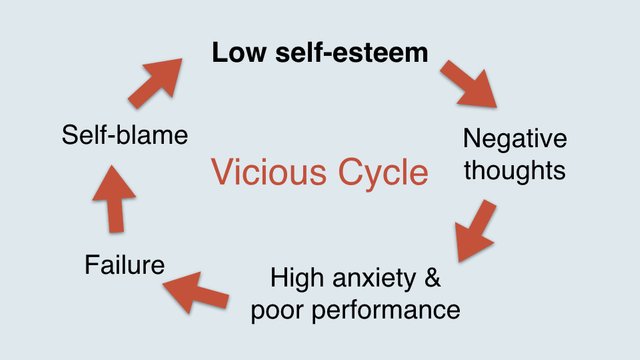
Artificially boosting self-esteem might be valuable for the individual, but this inflated self-worth could easily prompt some to demand preferential treatment or exploit others at a very real and considerable cost to society especially considering that little has been found to indicate that promoting self-esteem among children and adults for the sole reason of being themselves offers society any compensation beyond the self-edification of those involved.

It should be noted that all evidence for what promoting high self-esteem cures is not only notoriously unclear but is flawed or unsupported. There may be some correlations, but these correlations are just that, correlations and causation has not been established.
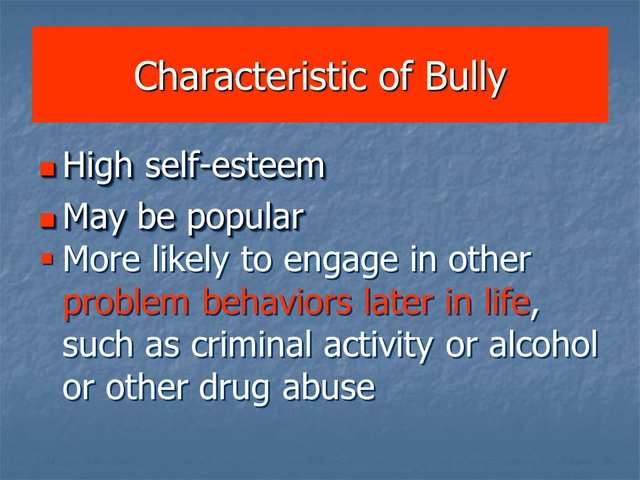
High self-esteem. May be popular. More likely to engage in other problem behaviors later in life, such as criminal activity or alcohol or other drug abuse.
Who do you find to be of higher servitude to society, of a higher value to society? The individual of high self-esteem, overly confident without cause, somewhat arrogant, perhaps competent or not, or the soft-spoken, humble individual, less confident, less boisterous, perhaps competent or not? Of inverse to what it is we have been espousing, that high self-esteem is the goal, there are many fine individuals of immense accomplishment, humble and self-deprecating and on the other hand, it is not uncommon for drug dealers, burglars, con artists and murderers to have very high self-esteem. Perhaps, once again, we have gotten it wrong.
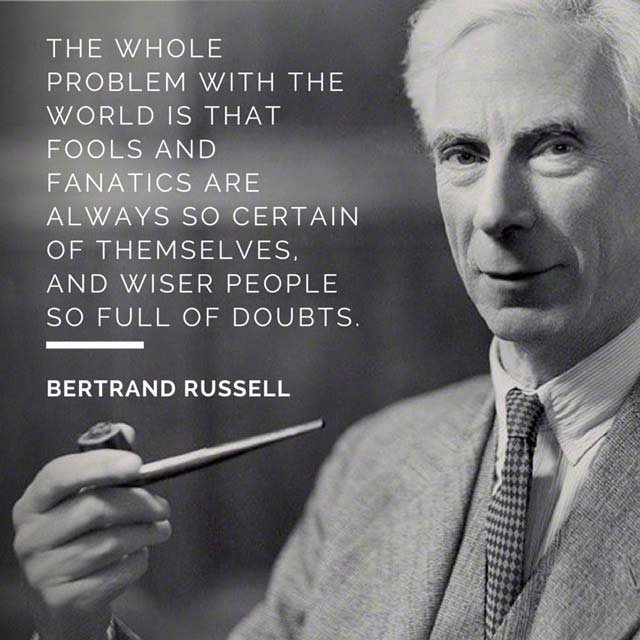
References
Andrews, J. A., & Duncan, S. C. (1997). Examining the reciprocal relation between academic motivation and substance use: Effects of family relationships, self-esteem, and general deviance. Journal of Behavioral Medicine, 20(6), 523-549.
Baumeister, R. F. (2001). Violent pride. Scientific American, 284(4), 96-101.
Baumeister, R. F., Campbell, J. D., Krueger, J. I., & Vohs, K. D. (2005). Exploding the self-esteem myth. Scientific American Mind, 16(4), 50-57.
Baumeister, R. F., Smart, L., & Boden, J. M. (1996). Relation of threatened egotism to violence and aggression: The dark side of high self-esteem. Psychological review, 103(1), 5.
Bishop, J. A., & Inderbitzen, H. M. (1995). Peer acceptance and friendship: An investigation of their relation to self-esteem. The Journal of Early Adolescence, 15(4), 476-489.
Buhrmester, D., Furman, W., Wittenberg, M. T., & Reis, H. T. (1988). Five domains of interpersonal competence in peer relationships. Journal of personality and social psychology, 55(6), 991.
Diener, E., & Diener, M. (2009). Cross-cultural correlates of life satisfaction and self-esteem. In Culture and well-being (pp. 71-91): Springer.
Keith, T. Z., Pottebaum, S. M., & Eberhart, S. (1986). Effects of self-concept and locus of control on academic achievement: A large-sample path analysis. Journal of Psychoeducational Assessment, 4(1), 61-72.
Lyubomirsky, S., Tkach, C., & DiMatteo, M. R. (2006). What are the differences between happiness and self-esteem. Social Indicators Research, 78(3), 363-404.
McGee, R., & Williams, S. (2000). Does low self-esteem predict health compromising behaviours among adolescents? Journal of adolescence, 23(5), 569-582.
Mecca, A., Smelser, N. J., & Vasconcellos, J. (1989). The social importance of self-esteem: Univ of California Press.
Murray, S. L., Rose, P., Bellavia, G. M., Holmes, J. G., & Kusche, A. G. (2002). When rejection stings: How self-esteem constrains relationship-enhancement processes. Journal of personality and social psychology, 83(3), 556.
Pottebaum, S. M., Keith, T. Z., & Ehly, S. W. (1986). Is there a causal relation between self-concept and academic achievement? The Journal of Educational Research, 79(3), 140-144.
Pullmann, H., & Allik, J. (2008). Relations of academic and general self-esteem to school achievement. Personality and Individual Differences, 45(6), 559-564.
Rusbult, C. E., Morrow, G. D., & Johnson, D. J. (1987). Self‐esteem and problem‐solving behaviour in close relationships. British Journal of Social Psychology, 26(4), 293-303.
Vohs, K. D., Bardone, A. M., Joiner Jr, T. E., & Abramson, L. Y. (1999). Perfectionism, perceived weight status, and self-esteem interact to predict bulimic symptoms: A model of bulimic symptom development. Journal of Abnormal Psychology, 108(4), 695.
Posted from my blog with SteemPress : http://h20ho.com/papers/is-boosting-self-esteem-a-good-thing/
To the question in your title, my Magic 8-Ball says:
Hi! I'm a bot, and this answer was posted automatically. Check this post out for more information.
So wise you are
Congratulations @h20ho! You have completed the following achievement on Steemit and have been rewarded with new badge(s) :
Click on the badge to view your Board of Honor.
If you no longer want to receive notifications, reply to this comment with the word
STOPTo support your work, I also upvoted your post!